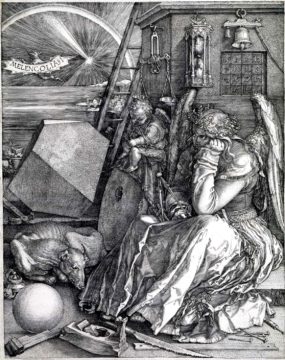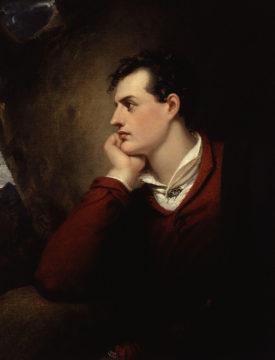by Jochen Szangolies

It’s no fun being sad. Indeed, great swaths of our culture seem aimed at fencing our little emotional gardens off against the intrusion of sadness, seeding them instead with what we think will germinate into little joys, grand hopes and profound happiness. ‘The pursuit of happiness’, after all, is enshrined in the American Declaration of Independence, and happiness economics is being touted as a balm for capitalism’s alienation of the working masses. The Kingdom of Bhutan tailors its governmental policies according to a ‘Gross National Happiness’-index, and yearly rankings of the World Happiness Report prompt breathless articles in the press asking what the Nordic countries do better than the rest of us. Clearly, we should strive for happiness, and where the weeds of sadness grow, uproot them and cast them out.
Yet, throughout my life, I have been drawn to the melancholia of sad songs, to a longing for I know not what, the gravity of overcast skies and rainy days. In a world that lionizes the pursuit of happiness, it’s easy to feel as if the strange comfort that sometimes hitches a ride with the oft-invoked ‘bittersweet’ nature of melancholia signals something deeply wrong with you, some malady that sets you at odds with the multitudes who, you’re given to understand, desire nothing so much as to be freed from the oppression of sadness, to emerge liberated into happiness.
I don’t think that’s right at all. Melancholia, to me, is a certain kind of surrender in the face of the unconquerable vastness of the world, and while that sounds negative at first, it at least holds the virtues of honesty and universality. Honesty, because the world really is vast and unconquerable, and you a spark caught up in its blaze, propelled upwards on the winds towards your eventual extinction. Universality, because so is everybody else.
Melancholia strikes me as being always directed at something beyond itself. Consider finding a discarded child’s toy in the bargain bin at a flea market (‘everything $1!’): there is something deeply mysterious in how a once beloved item might pass into oblivion. The melancholia you feel is brought on by a longing for what was, or might have been: for the child’s bright eyes upon being first presented with their gift, the joy they felt playing with it, the happiness it brought. What the toy signals to you is the fact that the joy and happiness it once brought has long since passed, leaving only a physical form—unloved, unremarkable—as its vanishing remnant in the world. It is an absence made present.
That joy and happiness itself, by contrast, was directed at the here and now: it exhausts itself in the present. The absent rarely plays a role for it. Happiness, for all its splendor, can be isolating: it is your happiness, it is for you, and while there is a vicarious happiness, say for a beloved other’s successes, that happiness is again just yours—you are the one that’s happy about a certain set of current circumstances that engender this happiness in you.
Melancholia, on the other hand, reaches out towards a greater human truth: that all things, in time, must fade, leaving only absences, and longing for what was, or might have been. In that sense, it is a feeling of community, and a foundation for empathy. The melancholic you is an enlarged you that contains the struggle of the single mother in her quiet nightly desperation, the anxiety of the overwhelmed child faced with the impossible task of laying the foundation of a life they can have no concept of, the lone old man feeding pidgeons in the park whose best friends have all gone.
A proper valuation of melancholia is not just a mere appreciation through opposition, of needing the dark to better see the light. Nor is it a balm for the stasis of unchanging happiness that can’t but grow stale. Either would make melancholia a mere via negativa to happiness, but it stands on its own, as a particular way of apprehending the finality of life: whatever happens, good or bad, is washed down the river equally, never to return.

There is, of course, a melodramatic element to this. Sitting back in the comfortable armchair, the melancholic temperament can seem overwrought, affected, and a bit clichéd. Seen from a distance, teary-eyed longing and hand-wringing anguish can seem like just so much drama. There is a certain kind of socially conditioned embarrassment in letting your feelings get the better of yourself in this way. You’re meant to keep your garden bright and clean, not succumb to overgrowth. And to be sure, teenage angst is an easy target for ridicule to the more sophisticated adult sensibility. Still, I maintain, even the most disaffected student of human nature is deeply familiar with the way an old picture or a lost letter found can transport one into a life that was, or might have been, but for the passage of time.
Footprints On Our Lives
I believe that this is due to a, perhaps unique, human capability: to see the absent in the present. It is not often obvious how strange an ability this is—partly because, as with a fish in water, we are constantly steeped deeply within it. When we see clouds in the sky, we also see the coming rain; when we see smoke, we think fire. You, looking at what amounts to strange squiggles on your monitor, or cell phone or wherever you’re reading this, perceive the meaning behind them, almost to the exclusion of any consciousness of the act of reading itself.

And I believe most emblematically, looking at footprints in the sand puts you in the mind of those who went there before you, animal or person. It is here that, I think, we meet the origins of the human capability of seeing the absent in the present. For put yourself in the mind of the paleolithic hunter, tasked with providing for their clan, their family: they are not, in general, faster, or stronger than their prey, or armed with any natural weaponry like claws or sharp teeth. Epimetheus found his bag empty when it came to equipping humanity with innate gifts.
What is it, then, that bestowed on humans the capacity to hunt and kill animals that, often enough, could easily outrun them, or triumph in any one-on-one confrontation? What made an unassuming primate into one of nature’s greatest killers?
The origin of the genus Homo lies with primates that subsisted predominantly on a diet of fruit. Our evolutionary adaptations tell the tale: our sense of smell, unlike the wolf’s, is inadequate to track the scent of a prey animal; our vision is great at picking out distinctions in our visual field, say a red fruit against the green background of the forest canopy, but lacks the acuity of the falcon. Nevertheless, some three million years ago, we started supplementing our diet with meat—which brings the added complication that, unlike fruit, meat tends not to stay in the same place to be picked and eaten.
Lacking the senses to directly follow our game, we thus needed to adapt to using absences instead: we began tracking, identifying tell-tale signs of the recent presence of prey animals in their spoor, their droppings, the ways leaves were torn or twigs were broken. We began, in short, to see the symbolic quality of our surroundings, began reading them as signs that point beyond themselves, towards the object of our desire. With that, we could relentlessly pursue our quarry, even when it was far out of reach, both in space, and time. Add to that a singular perseverance, and it was often simple exhaustion, rather than spears or traps, that sealed our prey’s fate. (Perhaps this is why, in our horror media, the image of the ever relentless evil, steadily, inexorably drawing closer plays such a large role: on some level, we can’t but empathize with the horror of what it must be like to be hunted by a human.)
Seeing the absent in the present is, in the view of 19th-century philosopher Franz Brentano, the mark of the mental—what he called ‘intentional in-existence’. Here, ‘in-existence’ does not negate ‘existence’, but refers to the existence of the absent ‘in’ the present, of the meaning in the symbol, or the object in the thought. It is what makes mental states directed towards something in the world, what makes your thought of an apple (or, as the case may be, an antelope to be roasted on the fire) connect to that apple (respectively antelope). It is also what underlies our symbol-manipulating prowess, and with that, our language, mathematics—and even science.
Such, at least, is the thesis of anthropologist Louis Liebenberg in his 1990 monograph ‘The Art of Tracking. The Origin of Science’, which poses the hypothesis that, lacking other gifts of our own, it was our need to use the present remains and reminders of what used to be that engendered our becoming as a symbolic species, and our need to interpret these symbols that constitutes the germ of modern science.
(Parenthetically, one might note that from this seed of science, then, it seems just a short hop and skip towards the origin of myth and religion. For reading animal tracks also requires to see life in the inanimate, to see intention and purpose where overtly there is only inert matter. How far is it then from this readiness to accept direction and agency beyond the immediately visible to spirits, nymphs inhabiting trees, hidden folk, or various gods of brook and field, of hearth and home?)
But what is also needed to tease out the present location of a prey animal from its past tracks is a facility to imagine what it is like to be this animal, a way to put ourselves into its place, into its mind: where was it going? Was it thirsty, drawn to the forest spring to the west? Or was it hungry, moving towards rich grazing grounds further east? Was it in a hurry, or taking its time?
In short, a measure of empathy is also needed to interpret these signs. An ability to imagine, what would it be like, if—a facility of counterfactual reasoning. And with this ability to find what was, or what might have been, in what is, we are at the core of human imagination—of crafting alternate possibilities, reaching beyond the immediate into the potential. And with the imagination of what might have been comes the ache of its absence—comes, again, melancholia.
Absence And The Creative Act
It is our being as symbolic creatures and our ability to substitute the absent for the present that makes melancholia, more so than most other affects, into a uniquely human trait, that itself enables us to go beyond our individual experience, to come into contact with the larger stream of being we each are caught up in. (In that respect, it is a surprising relation to awe.) But with this intrinsic capacity for other-directedness comes another aspect of human nature: namely, our creativity.
It is only via being able to first imagine a different way of being that we can ever find the impetus to create. Before the work comes the idea, and the idea is a present absence—something that not yet is, but might be. Perhaps, then, it is no longer so much of a mystery that there seems to be some connection between the melancholy and creative tempers: both are predicated on a preponderance of absence.
The melancholic artist has, of course, become a kind of cliché. Long-suffering from a unique kind of Weltschmerz, they can only endure their struggle via some desperate need to create, even at the cost of their own health and mind. The idea has considerable pedigree—even Aristotle (or a follower) wrote, in the Problems, of how ‘all those outstanding in philosophy, statesmanship, poetry or the arts are melancholic’ by nature. Still, it lends itself all too well to a certain kind of posturing, supplanting depth by dolor—if the artist’s heart is heavy, then does not my sad mien prove my art’s authenticity? (Another example of that most consequential of fallacies.)

And yet, there may be some germ of truth to it. After all, why should we create, if not to make real what isn’t (yet)? If we’re just happy with the way things are, why seek to bring something new into the world? What impetus could there be for making things the way they are not, if not dissatisfaction with the way they are?
Nick Cave, in his great ode to the anticipation of love and its ultimately impermanent nature, (Are You) The One That I’ve Been Waiting For, clothes it in a near-perfect couplet:
Out of sorrow, entire worlds have been built
Out of longing great wonders have been willed
As he goes on to expound in a lecture on the love song,
We each have a need to create and sorrow is a creative act. The love song is a sad song, it is the sound of sorrow itself. We all experience within us what the Portuguese call saudade, which translates as an inexplicable sense of longing, an unnamed and enigmatic yearning of the soul and it is this feeling that lives in the realms of imagination and inspiration and is the breeding ground for the sad song, for the love song is the light of God, deep down, blasting through our wounds.
Saudade, melancholia, is at the heart of the human capacity to see the absent within the present. As such, it is, if not the mother, then at least a sister to our empathy, our connection to something greater than ourselves, our arts, sciences, and perhaps even religion.
